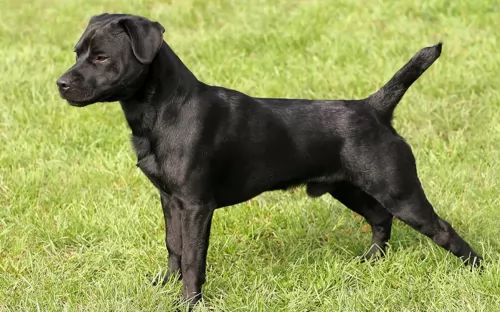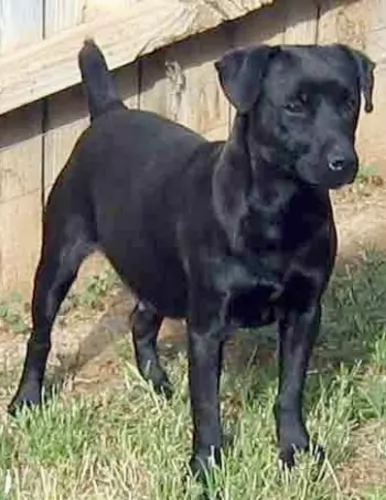 Petzlover
Petzlover Maltese is originated from Italy but Patterdale Terrier is originated from United Kingdom. Maltese may grow 15 cm / 5 inches shorter than Patterdale Terrier. Both Maltese and Patterdale Terrier are having almost same weight. Both Maltese and Patterdale Terrier has almost same life span. Both Maltese and Patterdale Terrier has almost same litter size. Maltese requires Moderate Maintenance. But Patterdale Terrier requires Low Maintenance
Maltese is originated from Italy but Patterdale Terrier is originated from United Kingdom. Maltese may grow 15 cm / 5 inches shorter than Patterdale Terrier. Both Maltese and Patterdale Terrier are having almost same weight. Both Maltese and Patterdale Terrier has almost same life span. Both Maltese and Patterdale Terrier has almost same litter size. Maltese requires Moderate Maintenance. But Patterdale Terrier requires Low Maintenance
 The Maltese dog hardly needs any introduction as this is an ancient breed which is still as popular as ever. Some people refer to it as the "Maltese Lion Dog," or "Melita" which was Malta’s previous name.
The Maltese dog hardly needs any introduction as this is an ancient breed which is still as popular as ever. Some people refer to it as the "Maltese Lion Dog," or "Melita" which was Malta’s previous name.
It was in the 19th century, that the Kennel Club settled on the name of Maltese for the dog breed. The dog has been selectively bred to keep its small size. The exact origin of the dog is unknown and there are various stories surrounding where its origins are, thought to be Italy.
It is believed that dogs such as spaniels and poodles have been used to bring about the Maltese. The American Kennel Club, a registry for pure bred dogs, recognized the breed in 1888.
 The Patterdale was developed in England,with his origins being linked to an early breeder with the name Joe Bowman.
The Patterdale was developed in England,with his origins being linked to an early breeder with the name Joe Bowman.
They were sought after for their prowess at guarding sheep from foxes. The dog was recognized by the United Kennel Club in 1995. It is believed the dog is descended from the Northern terrier breeds and can be traced far back.
 The Maltese is looked upon as a toy dog. Both male and female stand roughly between 20-25cm in height and weigh between 1 and 4kg.
The Maltese is looked upon as a toy dog. Both male and female stand roughly between 20-25cm in height and weigh between 1 and 4kg.
He is as cute as a button with a rounded skull, a pitch black nose, brown eyes and medium length floppy ears. The tail is feathery and is curled. He has a long, silky coat without an undercoat.
The color of his coat is pure white, and because he doesn’t shed he is looked upon as being hypoallergenic. Most people who own a Maltese like having the coat short to one length all round.
These little dogs have been bred to be companion dogs. They may be little, but it is a good idea to have him trained and socialized as they are inclined to be a bit snappy, especially with children.
He is intelligent, so training him won’t be difficult. Brought up the right way though, he can be good with children as well as pets in the home. They love their human families and want to be constantly with them. He is an energetic little dog too, and will just love ball games both inside and outside.
His very temperament and smallness make it that he fits perfectly into life in the city or the countryside. He is sweet and gentle but he makes a good watchdog, alerting you with his barking to strangers coming close by. Don’t leave him for long period of time as he hates being on his own and then he may start barking from sheer boredom and frustration.
 The Patterdale Terrier is a small sized dog that stands at between 25 and 40 cm in height and weighs 5 to 7kg.
The Patterdale Terrier is a small sized dog that stands at between 25 and 40 cm in height and weighs 5 to 7kg.
The coat of the dog can be smooth, broken or rough, but all coats are double and weatherproof. Colors include red, liver, black, bronze, black and tan or chocolate and sometimes brindle. The ears are floppy and medium length and the tail is also medium length and held high, curving slightly. It used to be docked and then ¼ to 1/3 of the tail was removed.
The Patterdale Terrier is small but he is bold and confident and very energetic. He will certainly need to be in a household where the family members are active, busy people. Because he is strong-willed he will benefit from training and socialization which will make him obedient and able to behave well in different situations.
 The Maltese is a popular dog no doubt, and his smallness is a draw-card as he adapts easily to life in the city or the countryside.
The Maltese is a popular dog no doubt, and his smallness is a draw-card as he adapts easily to life in the city or the countryside.
He is loving, loyal, intelligent and responsive, making him a good family dog and being an excellent playmate for children. Teach your children how to respect animals because raucous, disrespectful kids might produce a nip from an agitated Maltese.
Being a light shedder is another draw-card, with him being looked upon as a hypoallergenic breed. He has got so many good things going for him that he is guaranteed to make you an ideal pet.
 Intelligent, courageous and feisty, the Patterdale Terrier is a dog that will get on well with everyone in the house. Those who are active and outdoor types will be the best kind of dog owners for this active, energetic dog.
Intelligent, courageous and feisty, the Patterdale Terrier is a dog that will get on well with everyone in the house. Those who are active and outdoor types will be the best kind of dog owners for this active, energetic dog.
The Patterdale is confident and strong willed and will do superbly well with some training and socialization. With lots of love and care, your Patterdale Terrier can make you an excellent family pet and companion.
 Your Maltese is a feisty little thing who, with good care, can live for a good few years – up to 15 or even longer. As with any other dog, he can become ill. One or two illnesses to look out for include -
Your Maltese is a feisty little thing who, with good care, can live for a good few years – up to 15 or even longer. As with any other dog, he can become ill. One or two illnesses to look out for include -
Sebaceous adenitis is caused by inflammation of the sebaceous glands and is an uncommon skin disease found in some breeds of dog.
There are two types - one for long coated breeds and one for short coated breeds. For long or double-coated dogs, you’ll notice a white/silvery kind of dandruff on the coat as well as hair loss. There can also be skin lesions along the back and ears. It can make your pet miserable and he will need to see a vet.
A common hormonal problem is canine hypothyroidism, brought on by inadequate levels of thyroid hormones. Symptoms include hair loss, weight gain, coldness and a weakened immune system.
 The good news is that terriers have few health problems and they can live to a ripe age. Just like other dogs, they can also battle with some of the common dog ailments there are.
The good news is that terriers have few health problems and they can live to a ripe age. Just like other dogs, they can also battle with some of the common dog ailments there are.
Most allergens are foods, medicines or insects and exposure to the allergen can cause an over-reaction. In a dog, the most common symptom associated with allergies is itching of the skin. It can drive your pet mad as he licks and bites his skin. The symptoms of allergies can involve the respiratory system and he will have coughing and sneezing or even a discharge from the eyes.
Your Patterdales can also develop cataracts and glaucoma – two kinds of eye diseases. Glaucoma can unfortunately lead to blindness but something can be done if you recognize the signs. There are 2 main types of canine glaucoma, characterized by pressure inside the eye which can do damage to the retina and optic nerve – primary- and secondary glaucoma. Your vet will try to determine whether your pet has primary or secondary glaucoma to determine treatment.
 Your Maltese is going to require quality food, water, exercise and shelter to enjoy a good life. The type of food you feed any dog has a direct impact on his health.
Your Maltese is going to require quality food, water, exercise and shelter to enjoy a good life. The type of food you feed any dog has a direct impact on his health.
You need to provide him with quality food, and if its commercially manufactured food, you need to read the labels carefully so that the food is appropriate to your Maltese. For instance, you can’t mistakenly pull a ‘large-breed’ packet of food off the shelves and expect your Maltese to be able to stomach it.
If you do buy him this kibble, make sure the ingredients are wholesome. To break the monotony of eating kibble every day, give him some boiled chicken, brown rice and some raw or cooked vegetables chopped up finely into his kibble. He will love you for this as it makes a tasty meal for him and will keep him healthy.
Try to keep his diet nice and simple to avoid digestive problems.
Make sure he has constant access to fresh, cool water.
Make sure your Maltese dog has a nice warm, dry place to sleep.
Get him to the vet if you notice that he is ill.
Brush his hair twice a week and take him to have it professionally cut if you prefer.
Clip his nails when they become too long and check around his eyes and inside his ears for any kind of infection.
These little dogs are prone to dental problems and he will need to have his teeth brushed 2 or 3 times a week.
 Your Patterdale Terrier has a lot of energy, so as a responsible dog owner, you will need to see that he is exercised properly. This will include a walk every day as well as spending time throwing balls or a frisbee for him. He is a working breed and has been used to being mentally and physically stimulated.
Your Patterdale Terrier has a lot of energy, so as a responsible dog owner, you will need to see that he is exercised properly. This will include a walk every day as well as spending time throwing balls or a frisbee for him. He is a working breed and has been used to being mentally and physically stimulated.
The Patterdale Terrier isn’t a high maintenance dog and his coat will simply require a brush twice a week. Your pet can’t tell you about any pain he is experiencing so you will need to watch his body language.
Dogs can easily pick up an ear infection and this can be very painful. When you brush your pet, check inside his ears for signs of redness and discharge and check inside his mouth to see if you can spot any rotten teeth. Bad teeth can wreak havoc on his health. Keep the nails trimmed.
If you intend feeding your pet commercially manufactured food, good and well because it is a convenient way to feed your pet, but make sure its a quality food. This will ensure your dog is getting in the right amount of vitamins and minerals.
To vary his diet just a bit, provide him with some home-made food such as boiled chicken, brown rice or pasta, and some wholesome vegetables such as carrots, spinach and sweet potato. Dogs love the simplicity and nutritional value of food like this, and they don't have to worry about getting a stomach ache from strange foods. Try and include some raw meat into the kibble from time to time as well.
Never leave your Paatterdale Terrier without a constant supply of fresh cool water.